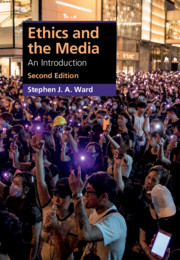Book contents
- Ethics and the Media Second Edition
- Cambridge Applied Ethics
- Ethics and the Media
- Copyright page
- Dedication
- Contents
- Introduction: Media Ethics in a Global Age
- 1 Doing Media Ethics
- 2 Reconstructing Media Ethics
- 3 Media, Engagement, and Democracy
- 4 Truth, Objectivity, and Fake News
- 5 Media Harm
- 6 Media and Extremism
- 7 Citizens, Media, and Macro-resistance
- 8 Global Media Ethics
- Bibliography
- Index
4 - Truth, Objectivity, and Fake News
Published online by Cambridge University Press: 22 October 2020
- Ethics and the Media Second Edition
- Cambridge Applied Ethics
- Ethics and the Media
- Copyright page
- Dedication
- Contents
- Introduction: Media Ethics in a Global Age
- 1 Doing Media Ethics
- 2 Reconstructing Media Ethics
- 3 Media, Engagement, and Democracy
- 4 Truth, Objectivity, and Fake News
- 5 Media Harm
- 6 Media and Extremism
- 7 Citizens, Media, and Macro-resistance
- 8 Global Media Ethics
- Bibliography
- Index
Summary
I have argued that media ethics is not antithetical to the freedom to publish. Media ethics recognizes freedom as a necessary condition of a democratic press. Without freedom, a robust journalism cannot exist. Yet media ethics also values how that freedom is used. The last chapter considers one way that media freedom should be used – to promote dialogic democracy. Dialogic democracy is the ultimate aim of responsible news media.
Keywords
- Type
- Chapter
- Information
- Ethics and the MediaAn Introduction, pp. 100 - 126Publisher: Cambridge University PressPrint publication year: 2020
- 1
- Cited by

